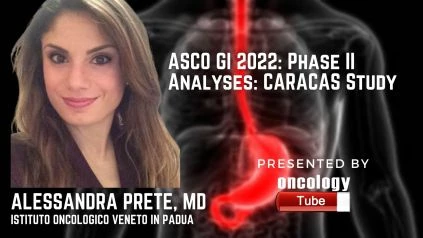Alessandra Prete, MD, Oncologist at Istituto Oncologico Veneto in Padua. In this video, she speaks about the ASCO GI 2022 Abstract – Extensive molecular profiling of squamous cell anal carcinoma in a phase 2 trial population: Translational analyses of the “CARACAS†study.
Â
Origins:
Advanced squamous cell anal cancer (aSCAC) is a rare and aggressive cancer with a poor prognosis and a high rate of morbidity. There are currently no targeted medicines available, and no standard treatments have been approved after the first line. Previous phase I/II trials using immune checkpoint inhibitors (ICI) showed evidence of efficacy, but predictive and prognostic indicators are absent. Given the rarity of KRAS mutations in aSCAC, anti-EGFR has been explored, with promising results. Preclinical research suggests that cetuximab (cet) and ICI may have a synergistic effect.
Â
Methodologies:
We investigated avelumab (ave) alone (Arm A) or with cet (Arm B) in pretreatment aSCAC in the phase II randomized study CARACAS (NCT03944252), with the overall response rate (ORR) as the primary outcome. To declare the trial positive, at least 4 responses out of 27 patients (pts) per arm required to be observed with a one-sided error of 0.05 and a power of 80%. We used FoundationOne CDx to examine HPV status, PD-L1 expression, microsatellite status, tumor mutational burden (TMB), and next generation sequencing (NGS) on pre-treatment tumor tissue samples. The primary goal was to use molecular analyses to describe the clinical results of ICI in SCAC in the CARACAS trial population. Secondary goals included determining progression-free survival (PFS) and overall survival (OS) in SCAC based on genetic features in order to identify novel prognostic biomarkers. The effect of the primary variables studied on survival was investigated using Cox regression. Because all of the patients got ICI, translational analyses were done on the entire research cohort.
Â
Findings:
The primary goal was met in the clinical trial (ORR 17 percent, 95 percent CI 56-347). High TMB (>10 mutations per megabase) was linked to a prolonged OS (HR=0.09; 95 percent CI 0.01-0.68; p=0.019), with PFS (HR=0.44; 95 percent CI=0.15-1.27; p=0.129) following suit. In addition, tumors with high PD-L1 expression (>40 on the combined positive score, CPS) had a substantially prolonged OS (HR=2.19; 95 percent CI=0.92-5.19; p=0.075) and PFS (HR=2.35; 95 percent CI=1.09-5.1; p=0.03). TILs above 1.2 had no effect on OS (HR=0.77; 95 percent CI=0.42-1.4; p=0.39) or PFS (HR=1.19; 95 percent CI=0.57-2.48; p=0.645). High TMB and PD-L1 indicated pts with substantially better prognosis in OS (HR=0.43; 95 percent CI=0.21-0.87; p=0.019) and PFS (HR=0.48; 95 percent CI=0.23-1.00; p=0.051) when paired with high TILs. Pts with high PD-L1 expression and TMB showed remarkable responses as well.
Â
Outcomes:
In mSCAC treated with ICI with or without anti-EGFR, the TranslaCARACAS trial found that elevated TMB and PD-L1 play a predictive effect. A subgroup of patients with exceptionally good prognosis and deep responses was discovered after stratifying by high TMB, PD-L1, and TILs. To corroborate our findings, more research in bigger cohorts is needed.

